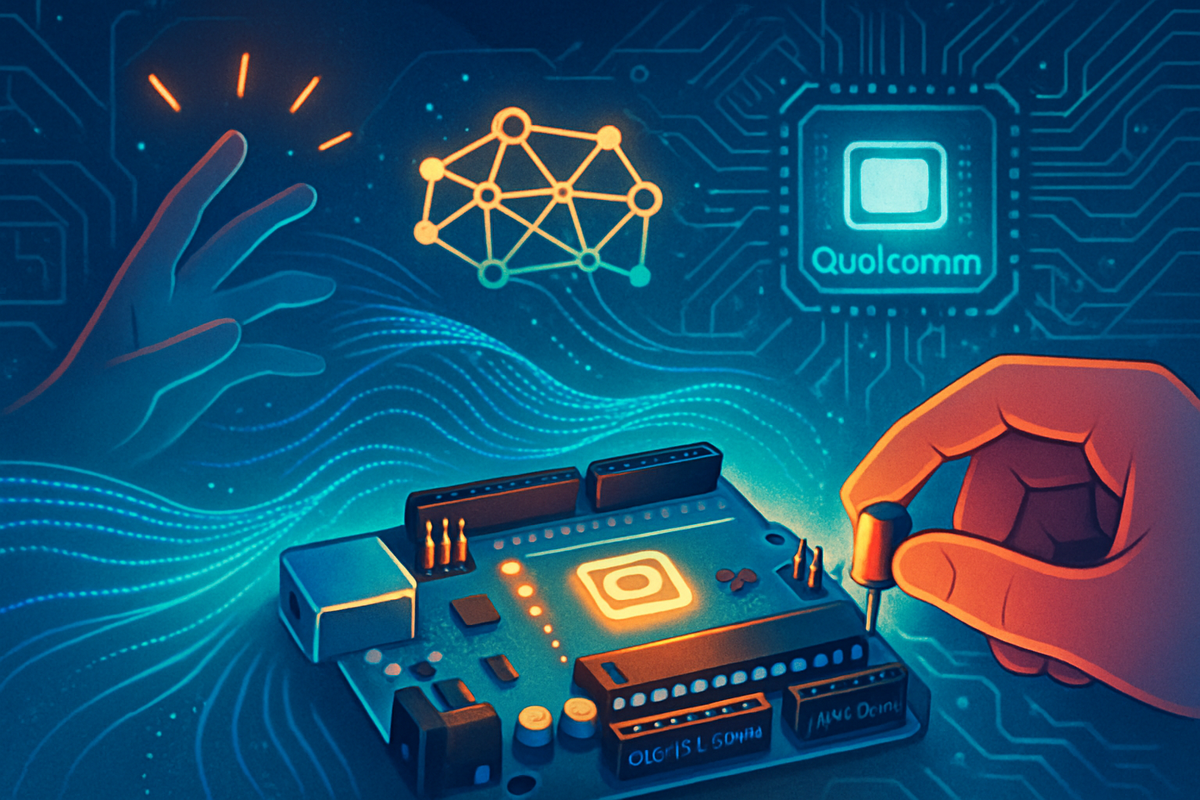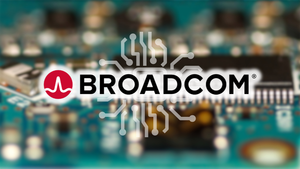
In a monumental move set to reshape the landscape of hardware and software development, Qualcomm Technologies (NASDAQ: QCOM) announced today, October 7, 2025, its definitive agreement to acquire Arduino, the globally recognized open-source hardware and software company. This strategic acquisition signals Qualcomm's aggressive push to deepen its roots in the burgeoning Internet of Things (IoT) and AI edge computing sectors, leveraging Arduino's vast and vibrant developer community to accelerate innovation and broaden the reach of its advanced technologies.
The integration of Arduino into the Qualcomm (NASDAQ: QCOM) ecosystem is poised to create a powerful synergy, combining Qualcomm's cutting-edge silicon and AI capabilities with Arduino's accessible platform and widespread developer adoption. While promising to democratize access to high-performance computing for a new generation of innovators, the announcement has also sparked discussions within the open-source community regarding the future of Arduino's independent ethos under a corporate giant.
Unpacking the Details: Qualcomm's Bold Bid for Open-Source Dominance
The acquisition, announced on October 7, 2025, marks a significant milestone in Qualcomm's (NASDAQ: QCOM) ongoing strategy to establish a comprehensive, full-stack platform for edge AI and IoT development. This move follows previous integrations of companies like Foundries.io and Edge Impulse, further solidifying Qualcomm's commitment to providing an end-to-end solution from hardware to cloud services. The core objective is to empower Arduino's estimated 33 million active users with Qualcomm's (NASDAQ: QCOM) advanced processing, graphics, computer vision, and AI capabilities, fostering a new era of sophisticated project development.
A key highlight of the announcement was the unveiling of the "UNO Q," a new Arduino development board powered by Qualcomm's "Dragonwing" processing chips. This "dual-brain" architecture features a Qualcomm Dragonwing QRB2210 processor alongside a real-time STM32U585 microcontroller, showcasing the immediate product synergy envisioned by the acquisition. Furthermore, Arduino introduced the App Lab, a new integrated development environment designed to streamline development across various operating systems and AI frameworks, indicating a clear path towards more unified and powerful development experiences. Qualcomm (NASDAQ: QCOM) has stated its intention for Arduino to maintain its independent brand, tools, and mission, reassuring the community of its commitment to supporting a diverse range of microcontrollers from various semiconductor providers and preserving Arduino's open approach.
Initial reactions from the market and industry have been mixed. While many analysts laud the strategic foresight of Qualcomm (NASDAQ: QCOM) in tapping into Arduino's (NASDAQ: ARDN) grassroots innovation, some members of the open-source community have voiced concerns. The primary apprehension revolves around the long-term preservation of Arduino's (NASDAQ: ARDN) open-source philosophy and brand independence when integrated into a company known for its proprietary chip designs. This delicate balance between commercialization and community values will be a critical aspect to watch as the integration unfolds.
Reshaping the Landscape: Who Wins and Who Faces New Challenges?
The acquisition of Arduino (NASDAQ: ARDN) by Qualcomm Technologies (NASDAQ: QCOM) creates clear winners and presents new challenges across the technology ecosystem. Qualcomm (NASDAQ: QCOM) stands to be a significant beneficiary, gaining immediate access to Arduino's (NASDAQ: ARDN) vast and engaged global developer community. This influx of millions of active users provides a direct channel for Qualcomm (NASDAQ: QCOM) to propagate its advanced edge AI and IoT technologies, accelerating the adoption of its processors and software tools. The strategic alignment positions Qualcomm (NASDAQ: QCOM) as a dominant force in the full-stack development space, from silicon to software and cloud services, thereby enhancing its competitive edge against rivals in the embedded systems and AI hardware markets.
For Arduino (NASDAQ: ARDN), the acquisition offers an unparalleled opportunity to scale its vision and enhance its product offerings. Access to Qualcomm's (NASDAQ: QCOM) cutting-edge silicon, with its powerful AI, graphics, and processing capabilities, will enable Arduino (NASDAQ: ARDN) to develop more sophisticated and high-performance development boards and tools. This partnership provides a clearer, more robust pathway for developers to move from rapid prototyping to commercialization, bridging the gap between hobbyist projects and industrial-grade applications. The announced UNO Q board is a testament to this immediate technological uplift, promising advanced capabilities previously unavailable on standard Arduino (NASDAQ: ARDN) platforms. The financial backing and global infrastructure of Qualcomm (NASDAQ: QCOM) will also likely boost Arduino's (NASDAQ: ARDN) reach and operational capabilities.
However, the event also poses challenges for other players in the market. Competitors in the microcontroller and embedded processor space, such as STMicroelectronics (NYSE: STM), NXP Semiconductors (NASDAQ: NXPI), and Microchip Technology (NASDAQ: MCHP), which have traditionally supplied chips for Arduino (NASDAQ: ARDN) boards, may face increased competition from Qualcomm's (NASDAQ: QCOM) integrated offerings. While Qualcomm (NASDAQ: QCOM) has assured continued support for diverse microcontrollers, the strategic push towards its own "Dragonwing" chips could gradually shift market share. Similarly, other open-source hardware platforms and their communities might find themselves needing to innovate more aggressively to maintain relevance against the newly empowered Qualcomm-Arduino (NASDAQ: QCOM) (NASDAQ: ARDN) tandem. The open-source community will closely watch whether Arduino's (NASDAQ: ARDN) core values of openness and accessibility are genuinely preserved, or if the commercial imperatives of a large corporation will eventually lead to a more closed ecosystem.
Broader Implications: A Catalyst for Edge AI and IoT Evolution
The acquisition of Arduino (NASDAQ: ARDN) by Qualcomm Technologies (NASDAQ: QCOM) is more than just a corporate takeover; it's a significant indicator of broader industry trends, particularly the accelerating convergence of AI, edge computing, and the Internet of Things (IoT). This event underscores the increasing importance of accessible, high-performance development platforms in democratizing advanced technologies. By bringing together Qualcomm's (NASDAQ: QCOM) powerful AI-enabled silicon with Arduino's (NASDAQ: ARDN) user-friendly ecosystem, the industry is witnessing a strategic move to lower the barrier to entry for developing sophisticated edge AI applications across various sectors, from smart homes and industrial automation to wearables and robotics.
The ripple effects of this acquisition are expected to be substantial. For competitors in the semiconductor industry, this move by Qualcomm (NASDAQ: QCOM) will likely intensify the race to provide more integrated and developer-friendly solutions. Companies like Nvidia (NASDAQ: NVDA), with its Jetson platform, and other embedded systems providers will need to respond with their own strategies to engage grassroots developers and offer comparable end-to-end development experiences. Partners within the Arduino (NASDAQ: ARDN) ecosystem, particularly those involved in software tools, cloud services, and module manufacturing, may see new opportunities for collaboration with Qualcomm (NASDAQ: QCOM), but also face the need to adapt to a potentially more integrated and Qualcomm-centric development pipeline.
While direct regulatory implications might not be immediately apparent, the increasing consolidation in critical technology sectors like AI and IoT could draw scrutiny in the long term, especially if it leads to concerns about market dominance or reduced competition. Historically, similar events, such as large tech companies acquiring open-source projects or developer platforms, have often led to debates about the balance between commercial interests and community values. For instance, IBM's (NYSE: IBM) acquisition of Red Hat brought enterprise-grade resources to an open-source giant, while also sparking discussions about the future direction of its open-source projects. This acquisition by Qualcomm (NASDAQ: QCOM) will be a case study in how a major chip vendor navigates and potentially leverages the open-source ethos for commercial gain while attempting to maintain community trust.
The Road Ahead: Innovation, Integration, and Ecosystem Expansion
Looking ahead, the acquisition of Arduino (NASDAQ: ARDN) by Qualcomm Technologies (NASDAQ: QCOM) promises a dynamic future, characterized by accelerated innovation and strategic ecosystem expansion. In the short term, we can anticipate a rapid integration of Qualcomm's (NASDAQ: QCOM) advanced AI and processing capabilities into more Arduino (NASDAQ: ARDN) boards, beyond the newly announced UNO Q. This will likely lead to a new generation of Arduino (NASDAQ: ARDN) products that are significantly more powerful, enabling developers to tackle more complex projects involving on-device AI, machine learning, and advanced sensor fusion. The App Lab, Arduino's (NASDAQ: ARDN) new integrated development environment, will also be crucial in unifying the development experience across this enhanced hardware portfolio, making sophisticated tools more accessible to a broader audience.
In the long term, this acquisition could solidify Qualcomm's (NASDAQ: QCOM) position as a leading provider of full-stack solutions for the intelligent edge. By nurturing Arduino's (NASDAQ: ARDN) vast developer community, Qualcomm (NASDAQ: QCOM) gains a powerful pipeline for future talent and innovative applications, potentially fostering new startups and commercial ventures built on its technology. This strategic pivot could see Qualcomm (NASDAQ: QCOM) expand into new market segments that require rapid prototyping and community-driven development, complementing its traditional enterprise and mobile focus. The challenge for Qualcomm (NASDAQ: QCOM) will be to maintain Arduino's (NASDAQ: ARDN) open-source integrity and community trust, ensuring that the platform remains accessible and vendor-agnostic in spirit, despite its new corporate parent.
Market opportunities are abundant, particularly in areas like smart city infrastructure, advanced robotics, medical IoT devices, and educational technology, where accessible yet powerful development platforms are crucial. However, challenges will also emerge, especially for other semiconductor companies and development tool providers who will need to recalibrate their strategies to compete with the newly integrated Qualcomm-Arduino (NASDAQ: QCOM) (NASDAQ: ARDN) powerhouse. Potential scenarios range from a seamless integration that propels both entities to new heights of innovation, to a more cautious path where community concerns about open-source independence become a significant hurdle. The success will largely depend on Qualcomm's (NASDAQ: QCOM) ability to genuinely empower the Arduino (NASDAQ: ARDN) community while strategically advancing its own commercial interests.
A New Chapter for Edge AI: Key Takeaways and Future Outlook
The acquisition of Arduino (NASDAQ: ARDN) by Qualcomm Technologies (NASDAQ: QCOM) on October 7, 2025, marks a pivotal moment in the evolution of the hardware and software development ecosystem, particularly for edge AI and IoT. The key takeaway is a clear strategic intent by Qualcomm (NASDAQ: QCOM) to democratize its advanced AI and computing capabilities by integrating them into Arduino's (NASDAQ: ARDN) universally accessible platform. This move is designed to leverage Arduino's (NASDAQ: ARDN) extensive developer community, transforming it into a fertile ground for the next generation of intelligent edge applications and significantly bolstering Qualcomm's (NASDAQ: QCOM) full-stack offerings.
Moving forward, the market will be closely watching how Qualcomm (NASDAQ: QCOM) balances its commercial objectives with Arduino's (NASDAQ: ARDN) foundational open-source philosophy. The success of this integration hinges on Qualcomm's (NASDAQ: QCOM) ability to maintain Arduino's (NASDAQ: ARDN) brand independence and its commitment to supporting a diverse range of hardware, as promised. If successful, this partnership could accelerate innovation in edge AI, making sophisticated technology more attainable for makers, educators, and professional developers alike, and potentially driving new waves of product development and commercialization.
Investors should closely monitor several factors in the coming months. These include the pace of integration of Qualcomm's (NASDAQ: QCOM) technology into Arduino (NASDAQ: ARDN) products, the adoption rates of new offerings like the UNO Q and App Lab, and, crucially, the sentiment within the Arduino (NASDAQ: ARDN) developer community regarding the preservation of its open-source values. Any signs of friction or a perceived shift away from Arduino's (NASDAQ: ARDN) core principles could impact the long-term success of this ambitious venture. Ultimately, this acquisition has the potential to redefine how edge AI solutions are developed and deployed, ushering in an era where high-performance computing is more accessible than ever before.
This content is intended for informational purposes only and is not financial advice




